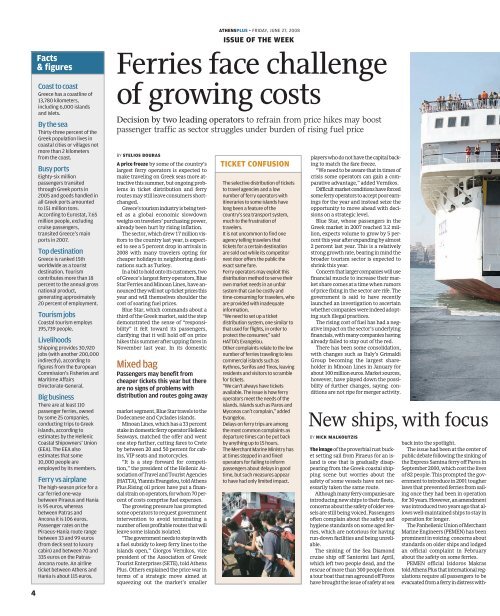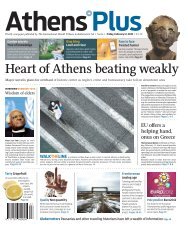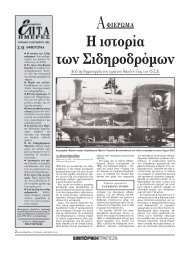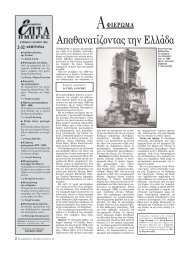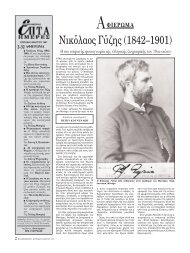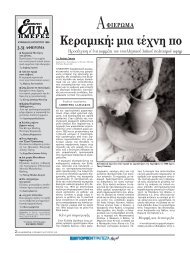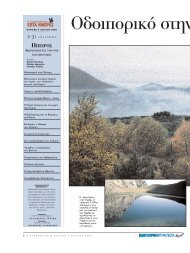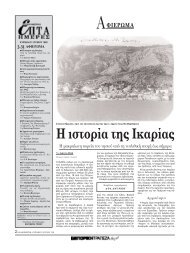27-06-2008
27-06-2008
27-06-2008
You also want an ePaper? Increase the reach of your titles
YUMPU automatically turns print PDFs into web optimized ePapers that Google loves.
4<br />
Facts<br />
& figures<br />
Coast to coast<br />
Greece has a coastline of<br />
13,780 kilometers,<br />
including 6,000 islands<br />
and islets.<br />
By the sea<br />
Thirty-three percent of the<br />
Greek population lives in<br />
coastal cities or villages not<br />
more than 2 kilometers<br />
from the coast.<br />
Busy ports<br />
Eighty-six million<br />
passengers transited<br />
through Greek ports in<br />
2005 and goods handled in<br />
all Greek ports amounted<br />
to 151 million tons.<br />
According to Eurostat, 7.65<br />
million people, excluding<br />
cruise passengers,<br />
transited Greece’s main<br />
ports in 2007.<br />
Top destination<br />
Greece is ranked 15th<br />
worldwide as a tourist<br />
destination. Tourism<br />
contributes more than 18<br />
percent to the annual gross<br />
national product,<br />
generating approximately<br />
20 percent of employment.<br />
Tourism jobs<br />
Coastal tourism employs<br />
195,739 people.<br />
Livelihoods<br />
Shipping provides 30,920<br />
jobs (with another 200,000<br />
indirectly), according to<br />
figures from the European<br />
Commission’s Fisheries and<br />
Maritime Affairs<br />
Directorate-General.<br />
Big business<br />
There are at least 110<br />
passenger ferries, owned<br />
by some 25 companies,<br />
conducting trips to Greek<br />
islands, according to<br />
estimates by the Hellenic<br />
Coastal Shipowners’ Union<br />
(EEA). The EEA also<br />
estimates that some<br />
10,000 people are<br />
employed by its members.<br />
Ferry vs airplane<br />
The high-season price for a<br />
car ferried one-way<br />
between Piraeus and Hania<br />
is 95 euros, whereas<br />
between Patras and<br />
Ancona it is 1<strong>06</strong> euros.<br />
Passenger rates on the<br />
Piraeus-Hania route range<br />
between 33 and 99 euros<br />
(from deck seat to luxury<br />
cabin) and between 70 and<br />
335 euros on the Patras-<br />
Ancona route. An airline<br />
ticket between Athens and<br />
Hania is about 115 euros.<br />
BY STELIOS BOURAS<br />
A price freeze by some of the country’s<br />
largest ferry operators is expected to<br />
make traveling on Greek seas more attractive<br />
this summer, but ongoing problems<br />
in ticket distribution and ferry<br />
routes may still leave consumers shortchanged.<br />
Greece’s tourism industry is being tested<br />
as a global economic slowdown<br />
weighs on travelers’ purchasing power,<br />
already been hurt by rising inflation.<br />
The sector, which drew 17 million visitors<br />
to the country last year, is expected<br />
to see a 5 percent drop in arrivals in<br />
<strong>2008</strong> with many travelers opting for<br />
cheaper holidays in neighboring destinations<br />
such as Turkey.<br />
In a bid to hold onto its customers, two<br />
of Greece’s largest ferry operators, Blue<br />
Star Ferries and Minoan Lines, have announced<br />
they will not up ticket prices this<br />
year and will themselves shoulder the<br />
cost of soaring fuel prices.<br />
Blue Star, which commands about a<br />
third of the Greek market, said the step<br />
demonstrated the sense of “responsibility”<br />
it felt toward its passengers,<br />
clarifying that it will hold off on price<br />
hikes this summer after upping fares in<br />
November last year. In its domestic<br />
market segment, Blue Star travels to the<br />
Dodecanese and Cyclades islands.<br />
Minoan Lines, which has a 33 percent<br />
stake in domestic ferry operator Hellenic<br />
Seaways, matched the offer and went<br />
one step further, cutting fares to Crete<br />
by between 20 and 50 percent for cabins,<br />
VIP seats and motorcycles.<br />
“It is a step forward for competition,”<br />
the president of the Hellenic Association<br />
of Travel and Tourist Agencies<br />
(HATTA), Yiannis Evangelou, told Athens<br />
Plus.Rising oil prices have put a financial<br />
strain on operators, for whom 70 percent<br />
of costs comprise fuel expenses.<br />
The growing pressure has prompted<br />
some operators to request government<br />
intervention to avoid terminating a<br />
number of less profitable routes that will<br />
leave some islands isolated.<br />
“The government needs to step in with<br />
a fuel subsidy to keep ferry lines to the<br />
islands open,” Giorgos Vernikos, vice<br />
president of the Association of Greek<br />
Tourist Enterprises (SETE), told Athens<br />
Plus. Others explained the price war in<br />
terms of a strategic move aimed at<br />
squeezing out the market’s smaller<br />
ATHENSPLUS • FRIDAY, JUNE <strong>27</strong>, <strong>2008</strong><br />
ISSUE OF THE WEEK<br />
Ferries face challenge<br />
of growing costs<br />
Decision by two leading operators to refrain from price hikes may boost<br />
passenger traffic as sector struggles under burden of rising fuel price<br />
Mixed bag<br />
Passengers may benefit from<br />
cheaper tickets this year but there<br />
are no signs of problems with<br />
distribution and routes going away<br />
TICKET CONFUSION<br />
The selective distribution of tickets<br />
to travel agencies and a low<br />
number of ferry operators with<br />
itineraries to some islands have<br />
long been a feature of the<br />
country’s sea transport system,<br />
much to the frustration of<br />
travelers.<br />
It is not uncommon to find one<br />
agency telling travelers that<br />
tickets for a certain destination<br />
are sold out while its competitor<br />
next door offers the public the<br />
exact same fare.<br />
Ferry operators may exploit this<br />
distribution method to serve their<br />
own market needs in an unfair<br />
system that can be costly and<br />
time-consuming for travelers, who<br />
are provided with inadequate<br />
information.<br />
“We need to set up a ticket<br />
distribution system, one similar to<br />
that used for flights, in order to<br />
protect the consumer,” said<br />
HATTA’s Evangelou.<br />
Other complaints relate to the low<br />
number of ferries traveling to less<br />
commercial islands such as<br />
Kythnos, Serifos and Tinos, leaving<br />
residents and visitors to scramble<br />
for tickets.<br />
“We can’t always have tickets<br />
available. The issue is how ferry<br />
operators meet the needs of the<br />
islands. Islands such as Paros and<br />
Myconos can’t complain,” added<br />
Evangelou.<br />
Delays on ferry trips are among<br />
the most common complaints as<br />
departure times can be put back<br />
by anything up to 15 hours.<br />
The Merchant Marine Ministry has<br />
at times stepped in and fined<br />
operators for failing to inform<br />
passengers about delays in good<br />
time, but such measures appear<br />
to have had only limited impact.<br />
players who do not have the capital backing<br />
to match the fare freeze.<br />
“We need to be aware that in times of<br />
crisis some operators can gain a comparative<br />
advantage,” added Vernikos.<br />
Difficult market conditions have forced<br />
some ferry operators to accept poor earnings<br />
for the year and instead seize the<br />
opportunity to move ahead with decisions<br />
on a strategic level.<br />
Blue Star, whose passengers in the<br />
Greek market in 2007 reached 3.2 million,<br />
expects volume to grow by 5 percent<br />
this year after expanding by almost<br />
2 percent last year. This is a relatively<br />
strong growth rate, bearing in mind the<br />
broader tourism sector is expected to<br />
shrink this year.<br />
Concern that larger companies will use<br />
financial muscle to increase their market<br />
share comes at a time when rumors<br />
of price fixing in the sector are rife. The<br />
government is said to have recently<br />
launched an investigation to ascertain<br />
whether companies were indeed adopting<br />
such illegal practices.<br />
The rising cost of fuel has had a negative<br />
impact on the sector’s underlying<br />
financials, with many companies having<br />
already failed to stay out of the red.<br />
There has been some consolidation,<br />
with changes such as Italy’s Grimaldi<br />
Group becoming the largest shareholder<br />
in Minoan Lines in January for<br />
about 100 million euros. Market sources,<br />
however, have played down the possibility<br />
of further changes, saying conditions<br />
are not ripe for merger activity.<br />
New ships, with focus<br />
BY NICK MALKOUTZIS<br />
The image of the proverbial rust bucket<br />
setting sail from Piraeus for an island<br />
is one that is gradually disappearing<br />
from the Greek coastal shipping<br />
scene but worries about the<br />
safety of some vessels have not necessarily<br />
taken the same route.<br />
Although many ferry companies are<br />
introducing new ships to their fleets,<br />
concerns about the safety of older vessels<br />
are still being voiced. Passengers<br />
often complain about the safety and<br />
hygiene standards on some aged ferries,<br />
which are notorious for having<br />
run-down facilities and being unreliable.<br />
The sinking of the Sea Diamond<br />
cruise ship off Santorini last April,<br />
which left two people dead, and the<br />
rescue of more than 300 people from<br />
a tour boat that ran aground off Poros<br />
have brought the issue of safety at sea<br />
back into the spotlight.<br />
The issue had been at the center of<br />
public debate following the sinking of<br />
the Express Samina ferry off Paros in<br />
September 2000, which cost the lives<br />
of 82 people. This prompted the government<br />
to introduce in 2001 tougher<br />
laws that prevented ferries from sailing<br />
once they had been in operation<br />
for 30 years. However, an amendment<br />
was introduced two years ago that allows<br />
well-maintained ships to stay in<br />
operation for longer.<br />
The Panhellenic Union of Merchant<br />
Marine Engineers (PEMEN) has been<br />
prominent in voicing concerns about<br />
standards on older ships and lodged<br />
an official complaint in February<br />
about the safety on some ferries.<br />
PEMEN official Isidoros Makras<br />
told Athens Plus that international regulations<br />
require all passengers to be<br />
evacuated from a ferry in distress with-


